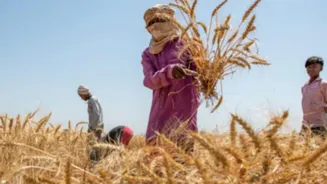On Independence Day, Prime Minister Modi outlined his vision for India’s journey towards ‘Atmanirbhar Bharat’ and, ultimately, a ‘Viksit Bharat’ by 2047.
Addressing the nation from the Red Fort, Modi reiterated
that India’s strength lies in its people, farmers, entrepreneurs, and its ability to innovate and build resilience in the face of global challenges. His call for ‘Vocal for Local’ was a rallying cry to reimagine India’s economic model by nurturing domestic industries and creating globally competitive brands rooted in local value chains.
At the heart of this vision is agriculture, which sustains nearly half of India’s workforce and remains the backbone of rural livelihoods. The path to Atmanirbhar Bharat requires transforming Indian agriculture into a modern, resilient, and globally competitive sector through food processing, value addition, and stronger linkages between farmers and markets. Here, national enterprises have stepped up, showcasing how private sector innovation can be harnessed for inclusive growth.
For decades, ITC has played a pioneering role in linking agriculture with rural employment generation. The company’s recent initiative, ITCMAARS, is a phygital ecosystem that brings the power of digital technologies to farmers, with FPOs as the anchor. It builds on the well-known e-Choupal initiative, which has empowered millions of farmers.
The ITCMAARS platform provides farmers with AI-enabled hyper-local, personalised crop advisories, access to credit, high-quality inputs, efficient market linkages, and the expertise of agri-tech start-ups. Their deep investments in food processing and agri-value chains have generated large-scale employment opportunities in rural areas.
Its network of manufacturing units across the country not only sources raw materials from local farmers but also creates ancillary jobs in packaging, logistics, and distribution. This dual focus on procurement and processing exemplifies how private enterprises can act as catalysts for rural prosperity.
The Prime Minister has repeatedly stressed that food processing is the future of Indian agriculture. By moving beyond raw crop production to processed foods, India can reduce wastage, increase farmer incomes, and enhance export competitiveness. Food processing is, in many ways, the bridge that connects farm productivity with consumer markets, both domestic and global.
Cooperatives like Amul have demonstrated the power of food processing to transform rural economies. By creating world-class Indian food brands that are respected globally, they have showcased how ‘Vocal for Local’ can become a powerful engine for national pride, farmer prosperity, and global competitiveness. Brands such as Aashirvaad atta or Amul’s dairy products stand as proof that local value chains can be grown while sustaining millions of rural households.
Modi’s speech also highlighted the importance of manufacturing in making India self-reliant. In agriculture, this translates to building a robust ecosystem of farm equipment, agri-processing units, and food manufacturing hubs that can reduce dependence on imports and provide large-scale employment in rural India. The integrated agri-business model already exemplifies this, sourcing from local farmers, processing domestically, and branding Indian products for both local and global markets.
Today, nearly 90 percent of ITC’s raw materials are sourced locally, a figure that not only boosts rural incomes but also enhances resilience in business operations by reducing exposure to global supply chain disruptions. This synergy between local sourcing, processing, and branding demonstrates how agriculture and manufacturing can come together in service of Atmanirbhar Bharat.
The PM’s broader vision of Viksit Bharat — a developed India by 2047 — cannot be realised without inclusive growth. Rural India must become an equal partner in this journey, and corporate India is showing the way. From farm to fork, their interventions create a multiplier effect: higher farmer incomes, rural job creation, skill development, and greater resilience in India’s food security.
Equally important is the alignment with sustainability. As climate change impacts farming patterns, enterprises must innovate with climate-resilient crops, efficient irrigation practices, and circular economy models in waste management. ITC has begun integrating these elements into its operations, reinforcing the idea that responsible growth is the only path to long-term prosperity.
To fully realise the potential of enterprises in nation-building, the government must create an enabling ecosystem. Enabling Ease of Doing Business, reducing regulatory hurdles, and offering fiscal incentives to enterprises investing in rural India will go a long way in strengthening their competitiveness.
The Prime Minister’s emphasis on ‘Vocal for Local’ is not only about consumer choices but also about policy support. National enterprises that invest in food processing, agri-infrastructure, and rural employment should be recognised as strategic partners in the journey towards Viksit Bharat. With the right support, India can create a globally competitive food and agri-manufacturing sector that uplifts rural India while projecting Indian brands on the world stage.
(Rajesh Mehta is an international affairs expert working on areas like market entry, innovation, and public policy. Views expressed in the above piece are personal and solely those of the author. They do not necessarily reflect News18’s views)












